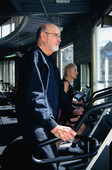- Could Your Grocery Store Meat Be Causing Recurring UTIs?
- Are You Making This Expensive Thermostat Error This Winter?
- Recognizing the Signs of Hypothyroidism
- 10 Strategies to Overcome Insomnia
- Could Artificial Sweeteners Be Aging the Brain Faster?
- Techniques for Soothing Your Nervous System
- Does the Water in Your House Smell Funny? Here’s Why
- Can a Daily Dose of Apple Cider Vinegar Actually Aid Weight Loss?
- 6 Health Beverages That Can Actually Spike Your Blood Sugar
- Treatment Options for Social Anxiety Disorder
Even in Later Life, Exercise Seems to Pay Dividends


A little exercise late in life may help men live longer, new research from Norway suggests.
“Even in the elderly, there is a lot to gain by being moderately active as compared to being sedentary,” said study lead author Ingar Holme, professor emeritus at the Norwegian School of Sport Sciences in Oslo.
The study of older men found that increasing physical activity benefited life span as much as quitting smoking.
“Given the evidence, physical activity is probably an important factor in getting people to age successfully,” Holme said. “But there are many things that we don’t know in this field.”
The research involved nearly 6,000 Norwegian men born from 1923 to 1932 who underwent a health check in 1972-1973 and again in 2000. Monitoring continued for almost 12 years.
Sedentary men said they spent a lot of time reading and/or watching TV. Moderate activity consisted of exercise, sports or heavy gardening for at least four hours a week, while vigorous activity involved hard training or competitive sports several times a week.
Through 2011 in the study, more than 2,000 men died. Holme said 51 percent of men who were sedentary in their 70s died from any cause, compared to about one-quarter of those who were moderately to vigorously active.
Just 30 minutes of moderate activity six days a week was associated with 40 percent lower risk of death, the researchers found. More exercise reaped even greater benefits, decreasing the odds of death from both heart disease or any cause, the researchers said.
Looking back further, men who were sedentary in their 40s lived five fewer years on average than those who were the most active.
The study doesn’t take into account the risk of injury from exercise, or fully examine which might have come first, poor health or lack of exercise. Nor did it prove that regular exercise caused the men to live longer, just that there was an association between the two.
Nevertheless, one expert said the study fits in with previous research linking physical activity to better health and quality of life.
“While we may not fully understand all the mechanisms, we do know that exercise, especially as we age, is a critical component in preventing [mental] decline, lowering the risk for depression and other mental health challenges, maintaining muscle mass and function, enhancing cardiorespiratory fitness, increasing social interactions, maintaining balance and coordination, and reducing fall risk,” said Brad Roy. He is executive director of the medical fitness center at Kalispell Regional Medical Center in Montana.
While the study says nothing about women, other research suggests they gain similar benefits, said Roy, who wasn’t involved in the study.
Need help getting motivated?
Phillip Sparling, a professor emeritus in the School of Applied Physiology at Georgia Institute of Technology, offers some advice: “Select exercise activities you enjoy, set a regular time and routine, exercise with friends, consult a personal trainer, make a plan, keep a written record, and share goals with family and friends.”
It’s also important to consult a health professional before beginning
any exercise plan.
The study appears May 14 in the British Journal of Sports Medicine..
More information
For more about physical activity, see the U.S. Centers for Disease Control and Prevention.
Source: HealthDay
Copyright © 2026 HealthDay. All rights reserved.










